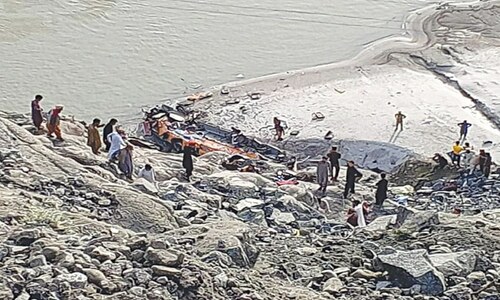LAHORE: In its first global analysis for 2014, the World Health Organisation (WHO) says that Pakistan is the only polio-endemic country which reported more polio cases last year than in 2012.
The analysis cited ‘non-uniform routine immunisation coverage’ with several areas having abysmally low routine immunisation coverage as major challenges which needed focus on fighting the crippling disease.
“There are 83 cases from Pakistan (compared with 58 for the same period in 2012), among a total of 369 cases reported from all over the world,” said the global polio monitoring body.
The report has been forwarded to the government with a detailed global comparison of the disease’s prevalence.
It compares Afghanistan’s level of commitment to polio eradication with that of Pakistan, a relatively peaceful country with lower security concerns.
According to the report, Afghanistan reported only 11 cases in 2013 and all of them were associated with multiple importations with no evidence of local re-established circulation (compared with 35 reported in 2012).
“Afghanistan is under consideration for removal from list of endemic countries indicating a significant positive development for them.”
It says that the number of global cases in 2013 stood at 369 (compared with 218 in 2012). The total number in endemic countries in 2013 was 145 (compared with 212 reported in 2012). Similarly, the number of polio cases reported in non-endemic countries in 2013 was 224 (compared with six of 2012).
In Pakistan, 59 cases were from Fata, 10 from Khyber Pakhtunkhwa and seven each from Punjab and Sindh.
All are type-1 cases, indicating one of the longest periods of no report of type-3 case from Pakistan. (The last cases were reported in April 2012 from Bara tehsil of Khyber Agency).
The latest polio case, with the onset of the disease on Dec 12, is from Toba Tek Singh in Punjab.
The report says the most recent epidemiological data complemented by genetic analysis of polio-viruses evidences that viruses from Toba Tek Singh, Sahiwal, Lahore and Multan are closely related with each other, reflecting a common source of outbreak because of a significant immunity gap in the central region of Punjab.
Therefore, the most immediate epidemiological challenge is to control this transmission in the region and, at the same time, build super high immunity in southern districts of the province to reverse previous trends of transmission moving to the south after the central region outbreak (e.g., 2008).
Overall review of data indicates that migrant and mobile population groups, including Afghan refugees and nomads, and people living in difficult-to-access areas remain at higher risk of infection and continue to contribute to the spread of the disease. This is largely due to incomprehensive implementation of recommended strategies for those people and their systematic follow up.
The report says that the four-to five-year cycle of outbreak of polio in central region where campaigns are held in less number than in other areas of Punjab is also because of the same reason.














































